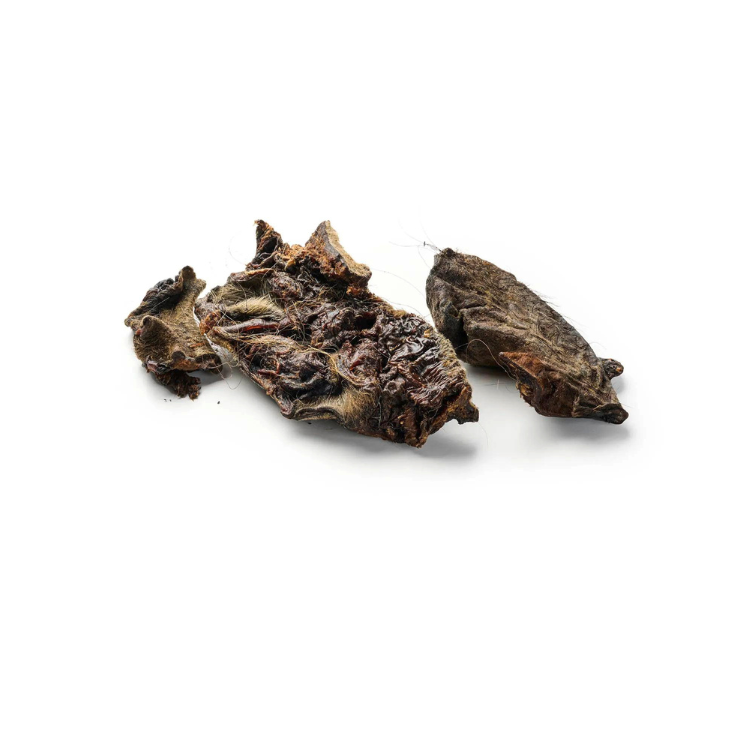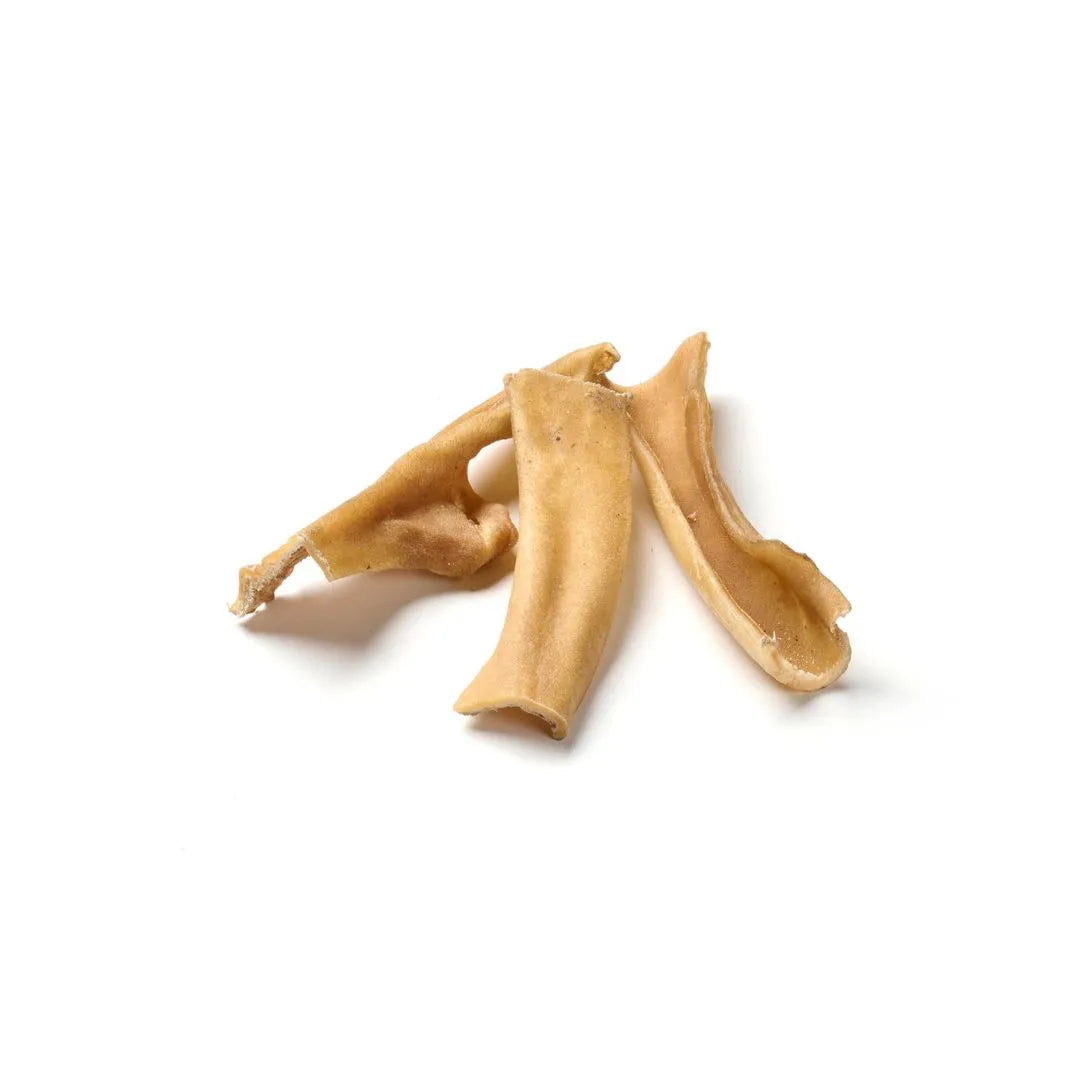
Parasite protection for your dog
Share
Parasites can have a significant impact on your dog's life. Whether fleas, ticks, worms or mites - these uninvited guests not only cause itching and discomfort, but can also cause serious health problems. That's why effective parasite protection is essential to keep your dog healthy and happy. In this article, you'll learn everything you need to know about the most common parasites, how to recognize them, treat them and, above all, how to prevent an infestation.
Content: Parasite protection for your dog
- Common parasites in dogs
- Rare parasites in dogs
- Detection and treatment of parasite infestation
- Preventive measures against parasites
- Special situations and risks
- Conclusion
Delicious dog snacks for pure enjoyment are available from us!
Common parasites in dogs
Dogs can be infected by several different types of parasites, each with different symptoms and health risks. It is important to know the most common parasites in order to take action early.
Fleas
Fleas are tiny, wingless insects that feed on the blood of their host. They are particularly annoying because they not only bite, but also lay eggs in your dog's environment. A flea infestation leads to severe itching, skin irritation and can trigger allergic reactions. In addition, fleas in dogs are vectors for tapeworms, which are transmitted by swallowing infected fleas.
These parasites are known for their high reproductive rate, with a single female laying up to 2000 eggs in her lifetime. This often leads to rapid and widespread infestation in your home and the surrounding area. Fleas on dogs can also transmit a variety of bacterial and viral diseases, which can make them a serious health risk for your dog and even humans.
Another problem is flea allergy dermatitis (FAD), one of the most common allergic skin diseases in dogs, caused by the saliva of fleas. This allergy leads to an excessive immune reaction that can result in severe skin inflammation and hair loss.
Controlling fleas requires a multi-pronged approach. In addition to treating your dog directly with spot-ons, oral medications or injections, it is crucial to also treat the environment. This includes regularly washing bedding, carpets and other fabrics where fleas and their eggs can survive.
Ticks
Ticks are bloodsuckers that attach themselves to your dog's skin and can suck blood for several days. Not only are they unpleasant, but they can also transmit dangerous diseases such as Lyme disease, anaplasmosis and ehrlichiosis. Ticks on dogs are particularly common in wooded areas and tall grasses.
These parasites are very resilient and can survive in the environment for a long time before finding a host. Once they have taken hold, it is important to remove them as soon as possible to minimize the risk of disease transmission. Since ticks can transmit various pathogens to dogs, it is crucial to take preventative measures such as regularly applying tick repellents and checking the coat after walks in at-risk areas.
worms
Worms are internal parasites that can infect various organs of your dog. The most common types include roundworms, hookworms, whipworms and tapeworms. They cause digestive problems , weight loss , anemia and, in the worst case, can even lead to death. Regular worming of dogs is therefore essential.
These parasites can be transmitted in a number of ways, including contact with infected soil, ingestion of infected intermediate hosts such as fleas, or eating raw meat. Symptoms of worm infestation can be subtle and often do not develop until the infestation is already advanced. Therefore, preventative dog worming is an important part of health care to prevent serious health problems.
Mites
Mites are tiny arachnids that can cause a variety of skin problems. The most common ones include ear mites, which lead to ear infections, and mange mites, which cause severe itching and hair loss. Mite infestations in dogs are often indicated by intense scratching and flaking, so if you're wondering why your dog is scratching , it could be due to mites.
Controlling mites in dogs often requires specific treatment based on the type of mite. These treatments may include topical medications, oral medications, or special shampoos aimed at eliminating the mites and soothing the dog's skin. Early detection and treatment of mites is crucial to prevent worsening of symptoms and further spread of infection.
Rare parasites in dogs
Although fleas, ticks and worms are among the most common parasites in dogs, there are a number of less common parasites that can pose equally serious health risks. These parasites are often less well known but can cause serious illness and require special attention in diagnosis and treatment.
- Babesiosis: This tick-borne disease is caused by single-celled organisms of the genus Babesia. They infect the red blood cells and can lead to severe anemia and general weakness. Treatment usually requires special antiparasitic medications.
- Leishmaniasis: Transmitted by sand flies, this disease is particularly common in Mediterranean and tropical areas. The Leishmania parasite attacks the skin, internal organs and the immune system. Treatment can be lengthy and often requires a combination of medications.
- Neosporosis: Caused by the parasite Neospora caninum, neosporosis is similar in symptoms to toxoplasmosis and can lead to muscle weakness, paralysis of the hind legs and neurological problems in dogs. This infection can be transmitted both through contaminated food and congenitally.
- Heartworm disease: While heartworm disease is common in some regions, it is rare in others and is therefore often overlooked. The mosquito-borne worms, Dirofilaria immitis, live in the heart chambers and blood vessels and can cause death if left untreated.
- Hookworm dermatitis: Caused by hookworm larvae penetrating the skin. This rare form of infection results in skin irritation and itching and requires topical or systemic treatment against the parasites.
Early detection and treatment of these rare parasites is crucial to avoid serious health problems. Regular veterinary examinations and preventive measures are essential to protect the dog from these and other parasites. If a rare parasitic infection is suspected, a veterinarian should be consulted immediately to ensure an accurate diagnosis and appropriate treatment.
High-quality dog chews for your faithful companion can be found here!
Detection and treatment of parasite infestation
To avoid health problems with your dog, you should check your four-legged friend regularly, because only if you recognize the uninvited guests can you effectively take action against them. A parasite infestation often initially becomes noticeable through behavioral changes. Your dog may be more restless, scratch or lick itself more often, or show changes in appetite . Other early signs are weight loss, dull fur, unusual discharge from the eyes or nose, and diarrhea. Regular checks help to recognize these symptoms early and act quickly.
diagnosis
Diagnosis of parasites is usually done through a thorough examination of your dog and his environment. A veterinarian can determine if your dog is infected with parasites using special tests such as skin scrapings, blood tests or stool tests. Flea combs and visual inspections help detect fleas and ticks.
Additionally, imaging techniques such as ultrasound or x-rays can be used to identify internal parasites such as heartworms that are not directly detectable by external examination. These methods can also help assess the severity of the infestation and the impact on internal organs.
Another important aspect of diagnosis is taking a detailed medical history, including information about previous parasite infestations, current medications, and behavioral changes in your dog. This will help the veterinarian get a complete picture of your dog's health situation and choose the best course of treatment.
Molecular diagnostic tests such as PCR (polymerase chain reaction) are also sometimes used to detect specific parasite DNA or RNA, allowing for more accurate identification, especially in difficult-to-diagnose cases. These tests are particularly useful in detecting parasites that are intermittent or present in low numbers.
By combining these examination methods, a comprehensive picture of your dog's health can be created and the necessary steps can be taken to treat and prevent further parasite infestations.
Treatment options
There are several treatment options to combat parasite infestations, ranging from topical preparations applied directly to the skin, to oral medications, to special shampoos and sprays. Each method has its advantages and disadvantages, and the choice of treatment depends on the type of parasite and the health of your dog.
Topical preparations:
- Advantages: Often provide quick relief and are easy to use.
- Disadvantages: Can cause skin irritation in sensitive dogs and must be protected from contact with water.
- Benefits: Effective in combating many types of internal and external parasites.
- Disadvantages: Often require precise dosing and can cause gastrointestinal discomfort in some dogs.
- Benefits: Helpful for instantly removing fleas, ticks and other external parasites.
- Disadvantages: Their effect is often short-lived and they require regular applications.
- Advantages: Long-lasting effect with a single application, ideal for long-term prevention.
- Disadvantages: Must be administered by a veterinarian and is not suitable for all types of parasites.
These treatments can be used individually or in combination, depending on the severity of the infestation and the dog's lifestyle. It is important to work with a veterinarian to develop the most appropriate and safest treatment strategy tailored to your dog's specific needs and health.
Preventive measures against parasites
Prevention is the best protection against parasite infestation. With the right preventative measures, you can significantly reduce the risk of your dog becoming infected with parasites. Regular veterinary check-ups are crucial to preventing parasite infestation. Brush your dog regularly and check his coat for signs of fleas and ticks. Clean his sleeping areas and wash his blankets and toys regularly to ensure a clean and parasite-free environment.
Effective preventative treatments include spot-on preparations, which are liquid medications applied directly to the dog's skin and provide several weeks of protection against fleas, ticks and other parasites. Antiparasitic collars are also a good option, as they continuously release active ingredients that repel and kill parasites and are usually waterproof and last for several months.
For those who prefer a more convenient alternative, oral medications offer protection against a wide range of parasites. These tablets, sometimes given monthly or less frequently, act systemically and can also provide long-lasting protection.
In addition, there are natural anti-parasite remedies, such as essential oils or herbal preparations. These options are often gentler on the dog's skin and immune system. However, it is important to be aware of possible allergies and skin reactions when using natural remedies, as their effectiveness can vary.
By combining these methods, you can build a comprehensive line of defense against parasites and effectively protect your dog's health and well-being.
Nutrition and immune system
A balanced and healthy diet can play an essential role in preventing parasite infestation. A strong immune system helps your dog to better defend itself against parasites and minimize their effects.
Here are some nutritional tips that can boost your dog’s immune system:
- High-quality dog food: Choose a dog food that is rich in high-quality proteins, vitamins and minerals. Proteins are important for building and repairing tissue and supporting the immune system.
- Omega-3 and omega-6 fatty acids: Found in fish oil and certain chews such as dried fish and meats like salmon and herring , these essential fatty acids can reduce inflammation and boost the immune system.
- Fresh fruits and vegetables: Supplement your dog's diet with fresh fruits and vegetables that are rich in antioxidants. These help fight free radicals and support the immune system.
- Probiotics: Probiotic supplements can improve gut health, which in turn strengthens the immune system. A healthy gut can also help fight off parasites.
- Adequate hydration: Make sure your dog always has access to fresh water . Good hydration is important for all body functions, including a healthy immune system.
- Avoid sugar and artificial additives: Sugar and artificial additives can weaken the immune system. Make sure that the dog food is as free of these ingredients as possible. Instead of cheap treats, which often contain sugar and artificial additives, you can opt for high-quality and low-fat chews . These are not only healthier, but also provide additional nutrients.
By providing the right diet, you can help strengthen your dog's immune system and help him better resist parasite infestations.
Special situations and risks
Some situations require special precautions to prevent or treat a parasite infestation. Here are some examples where special attention is needed.
Travelling with your dog
When traveling with your dog, it is important to pay attention to parasite protection. Different regions have different parasite risks. Before you travel, find out about local parasites and the best protection measures. Preventative treatments should be started before you leave to ensure effective protection throughout your trip. But it is important to also give your dog a thorough check-up after you return to make sure they have not brought any parasites with them.
Young, old and sick dogs
Puppies , older dogs and sick dogs are particularly susceptible to parasite infestation and its consequences. These animals require particularly careful monitoring. Here too, regular visits to the vet help to monitor the health of these more sensitive groups and to intervene early if necessary.
Conclusion
Parasites such as fleas, ticks, worms and mites can not only cause discomfort, but also transmit serious health problems and diseases. Through regular check-ups, adapted treatments and careful monitoring of hygiene, you can significantly improve your dog's protection.
Choosing the right prevention methods, such as spot-ons, collars, oral medications and even natural remedies, should be tailored to your dog's specific needs. Additionally, special situations such as traveling or caring for young, old or sick dogs require extra attention. Overall, proactivity is key to preventing parasite infestations and maintaining your four-legged friend's health.
Pamper your dog with our delicious chews!















